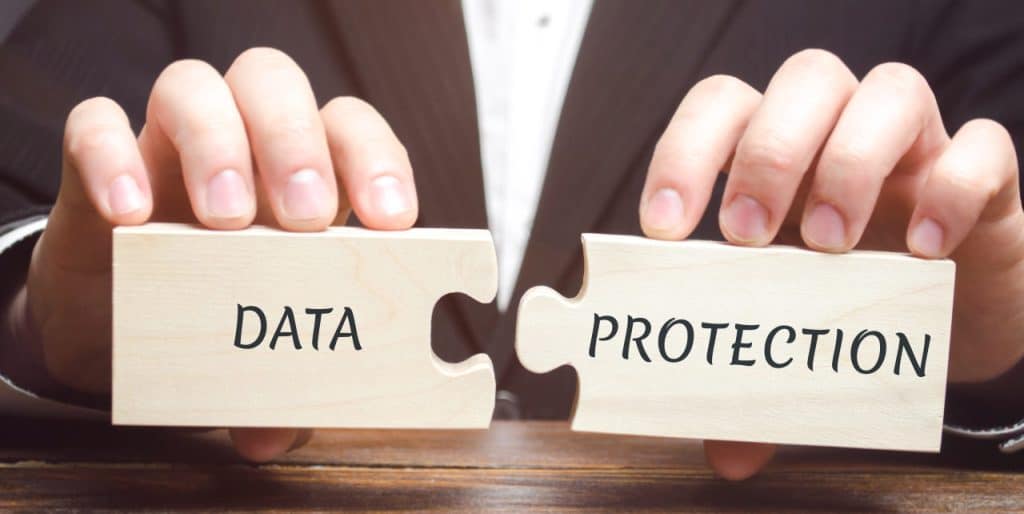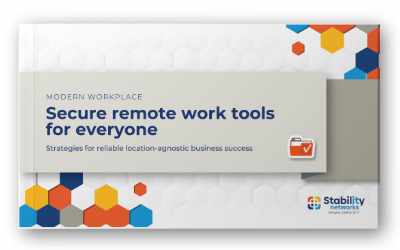Data rules our world—the International Data Corporation estimated in 2020 that there were 64 zettabytes of information online. And since nobody can really picture just how much that is, think about it like this. To get one zettabyte of data, you would have to fill 34,359,738,368 (34.4 billion) smartphones to capacity. If you put 34.4 billion iPhones end-to-end (length-wise) you could go around the Earth 121.8 times.
And since 2020, we’ve had a major digital transformation—thousands of businesses were forced to move online to keep up and people were spending hours more online per day. But when you enter your name, address, and credit card number to do some online shopping, do you know what’s happening with that information?
That’s the core of data privacy: having the option and ability to share your information only with the people you want to share it with. But let’s face it—we’re not always thinking about that when we put in our info, which is why it’s so important for everyone to have a basic understanding of data privacy, what it means, and how you can protect yourself against misuse.
What Is Data Privacy?
Data privacy, or information privacy, is the right to decide what data of yours can be collected and used. This means you have control over who has access to your personal information, how it’s stored, and what’s done with it. It also applies to digital information—like your online activities and purchases—which can then be used for marketing, advertising, or other purposes.
Data privacy is about more than just protecting your identity. It’s the idea that you should be able to control who gets access to your data, and how it’s used. This is especially important in a world where companies are collecting huge amounts of personal data from users without their knowledge or consent.
When you search for something and then get ads the next day for the same exact thing you searched for, that’s likely because the company is tracking your data. Or if you’ve ever been offered a discount on something you recently purchased, that too could be due to the company tracking your data and using it for marketing purposes.
Let’s use social media as an example of “bad” data privacy, or an unethical use of someone’s information. TikTok took the world by storm in the last year or two, but it doesn’t have the greatest track record when it comes to privacy. In December 2022, employees at the parent company of TikTok—ByteDance—misused their access to track the IP addresses of US TikTok users. Some claim that the employees were trying to figure out the physical location of the users.
A settlement just recently ended over claims that the app was using facial recognition without users’ permission. In 2019, TikTok paid the FTC $5.7 million in a settlement because the app (formerly Musica.ly) was collecting and storing the personal information of minors. The bottom line is that some businesses use your data ethically and others do not.
There aren’t currently any federal laws that dictate how businesses should use your information; however, there are state laws and many organizations do have privacy statements. So, is it really that big of a deal that people have access to your information? The short answer: yes, and here’s why.
Why You Should Care About Data Privacy
As a user, you’ve most likely shared everything from your name to your social security number online. When that information is recorded, there’s a small chance that it gets deleted. Some businesses have guidelines on deleting private information or have good security measures to store it, but it’s not consistent.
If someone malicious gets ahold of your SSN (and there’s a 45% chance they will), they can steal your identity, take all the money from your bank account, create credit cards in your name, and use your identity if they’re ever picked up for criminal activity—just to mention some of the more dramatic consequences.
If you’re a business owner and you’re worried about data privacy, remember that the ways you handle data are directly tied to your personal brand and how you treat your customers. If you mishandle customer data, it could cost thousands of dollars and hurt your reputation.
It’s essential to have some sort of privacy policy on your website and to be transparent with your customers about how their data is being used. Never sell or give away customer data, and make sure you’re encrypting all the information. The more secure your customers’ data is, the more they’ll trust you!
What Every User Should Know About Data Privacy
We’ve talked about why criminals want your personal information and why businesses should take data privacy seriously. Now, let’s get into what you can do to protect your data.
1. Check the privacy policies and terms of service: Whenever you’re signing up for anything online, make sure to read the full privacy policy before giving away any personal information. The policy should state how they use your data and what measures are in place to protect it.
2. Use a secure password: Create a unique password for each account you create and make sure they’re not easy to guess (for example, avoid birthdays or other predictable numbers). The longer and more complex the better.
3. Be cautious with public Wi-Fi: When you’re connected to a public network (like at the airport or coffee shop), be careful of what information you share. Don’t check your bank account or make any purchases when connected to these networks since they are not secure.
4. Use MFA: Multi-factor authentication is a security system that requires more than one form of identification to access an account. It’s the best defense against identity theft and should be enabled on all of your accounts.
5. Stay updated on data privacy news: By learning about how bad actors are accessing data, you can stay one step ahead of the game and protect your information better.
6. Know the laws that protect you: Regulations from the FTC, HIPAA, and more exist to protect the data of citizens. Learn more about what laws are in place in your state or country to help keep you safe online.
Respect Your Customer Data With Stability Networks
By implementing powerful software and educating your employees on good cyber hygiene, Stability Networks can keep your data safe. And if a breach ever does happen, we’ll have all the tools you need to get back to business in no time. Schedule a consultation to see how we could help protect your customers’ private information.






